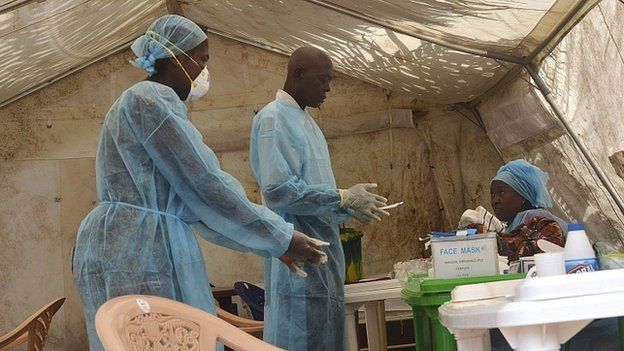Ebola outbreak: West African states agree strategy
- Published

Health ministers from 11 West African countries have adopted a common strategy to fight a deadly Ebola outbreak in the region.
At an emergency meeting in Ghana, ministers promised better collaboration to fight what has become the world's deadliest outbreak to date.
So far, 759 people have been infected with the virus in Guinea, Liberia and Sierra Leone and 467 of them have died.
The two-day meeting was called by the World Health Organization (WHO).
Under the new strategy, the WHO will open a sub-regional control centre in Guinea to co-ordinate technical support.
Keiji Fukuda, the WHO's assistant director-general of health security, said it was "impossible to give a clear answer" on how far the epidemic could spread.
"I certainly expect that we are going to be dealing with this outbreak, minimum, for a few months to several months," he told AFP news agency.
"I really hope to see a turnaround where we begin to see a decrease in cases in the next several weeks."
BBC West Africa correspondent Thomas Fessy says educating people rather than closing borders is seen as the most effective way to contain the outbreak.
Cultural practices and traditional beliefs in some areas have hampered public health measures, contributing to the spread of the disease, he adds.
In some cases, mobs have attacked health workers forcing emergency centres to close.
The WHO has already sent more than 150 experts into West Africa over the past few months to try to contain the outbreak.
But it says political commitment is needed from the region itself to ensure this outbreak is stopped soon.
Most of the deaths have been centred in the southern Guekedou region of Guinea, where the outbreak was first reported in February.
But health officials say the region's porous borders have allowed infected people to carry the disease into other countries.
Ebola spreads through contact with an infected person's bodily fluids and there is no vaccine or cure. It kills up to 90% of those infected.
Ebola virus disease (EVD)
- Symptoms include high fever, bleeding and central nervous system damage
- Fatality rate can reach 90%
- Incubation period is two to 21 days
- There is no vaccine or cure
- Supportive care such as rehydrating patients who have diarrhoea and vomiting can help recovery
- Fruit bats are considered to be the natural host of the virus
- Published2 July 2014
- Published13 November 2014
- Published1 July 2014
- Published24 April 2014
- Published8 October 2014
- Published1 April 2014